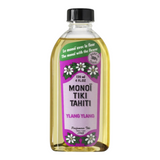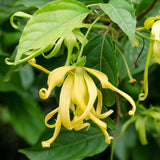MONOI TIARE TAHITI is a French-Tahitian cosmetic oil made of pure coconut oil and the fragrance of “tiare”, the Tahitian Gardenia flower. This product is a refinement of an ancient Polynesian beauty secret and has been manufactured commercially in Tahiti since 1942. Centuries ago the people of Polynesia discovered that pure coconut oil is an essential secret for beautiful skin and hair. Coconut oil is a natural replacement for your body’s skin and hair oils. The coconut oil used in Monoi Tiare Tahiti is so highly refined that it is quickly absorbed by your skin. This level of cosmetic refinement is what makes Monoi so unique and special. Monoi Oil, the Tahitian beauty secret, is now available to you.
SKIN MOISTURIZER
Monoi is a soothing and protective oil that penetrates and moisturizes the upper layers of the epidermis to nourish and smooth your skin. In Polynesia, Monoi is used as a full-body moisturizer to protect skin against the drying effects of intense tropical sun, harsh winds and saltwater. For soft supple skin, use MONOI TIKI TAHITI as both a moisturizer and as a bath oil. It massages quickly into the skin, smoothing away dryness and leaving behind a delightful natural fragrance of island flowers. Excellent for baby care, coconut oil is very close in nature to the oils that your own skin and scalp produce. It will hydrate without stripping away your natural oils. Be sure to apply the right amount of Monoi on to your skin. If you feel oily, you have used too much.
HAIR CONDITIONER
MONOI TIKI TAHITI may be used as a conditioner for dry hair. In many of the low-lying islands of Tahiti and throughout Polynesia, freshwater is a precious commodity. People will often bathe and shampoo in salt water and then rinse with fresh water. Saltwater, wind and sun have a harsh drying effect on the hair. So, after bathing, Tahitians will use Monoi as a natural conditioner on their hair. Monoi helps to hydrate, strengthen, revive, moisturize, and nourish hair of all types giving your hair body and sheen. Monoi’s repairing and conditioning properties leave the hair soft, supple and shiny. Pour a small amount into the palm of your hand and massage it into your hair. Shampoo out after 10 or 15 minutes. The oil will enter the hair and replace the natural oils, giving your hair natural body and sheen.
A SUBTLE PERFUME
Monoi smells good! Throughout Tahiti, one will constantly be aware of the aromas from the many people using Monoi. Coconut oil has a fragrance all its own. To this natural fragrance, the oils and smells of several tropical flowers are infused onto Monoi. The Tiare, or Tahitian Gardenia, is the original fragrance with its roots in the ancient past. This flower grows everywhere in Tahiti and its aroma is an integral part of Polynesia. Next in line, evocative, powerful and highly fragrant, Pitate, known as Pikake in Hawaiian, is a jasmine flower that produces the strongest and most profuse of all Monoi fragrances. Tipanie, also called plumeria or frangipani, has a lush, complex and rich floral fragrance that is also the most delicate or subtle fragrance found in Monoi. Vanille, or Vanilla, is not just a flavor. It is a very popular Monoi fragrance in combination with coconut oil. Vanilla is one of the major exports from Tahiti. Ylang Ylang, native to Asia and Australia, is called the perfume tree. This heavy, sweet and slightly floral fragrance is one of the most popular perfume aromas of today. Santal, or the sandalwood fragrance, is well known around the world and is the most popular of monoi fragrances for men. Finally, Coco, or coconut as a fragrance, is the natural aroma of the highly refined coconut oil used in Monoi. A very small amount of Tiare is in this fragrance from the dried flower in the bottle.
MONOI WILL TURN SOLID
Please note that because of the natural properties of coconut oil, the true Monoi oil will solidify at temperatures below 68 F (20 C). This is a natural process that occurs because genuine MONOI contains no emulsifiers to keep it in a liquid state. Solidification is one of the ways to prove that you have the real Monoi. The oil in the bottle can look like it is spoiling and growing an algae or fungus on the walls of the bottle just as the solidifying first starts. The dried flower in the bottle will further give the impression that the oil has gone bad. Simply place the bottle in warm water or hold the bottle in a warm grasp to return the oil to a golden liquid form. Solidifying and warming will not affect the original properties of MONOI. Do NOT use a microwave oven to warm MONOI.
THE FLOWER IN THE BOTTLE
The original MONOI TIKI TAHITI has been made by Parfumerie Tiki since1942. Inferior counterfeit copies of Monoi began to appear throughout Europe from other parts of the world in the 1970s. None of these copies have ever come close to the qualities found in Monoi Oil. Ever since this time, Parfumerie Tiki has placed a dried tiare flower in every bottle of Monoi it sells in order to show that this is the true Monoi. The flower in the bottle is a trademark.







